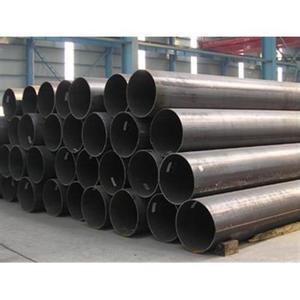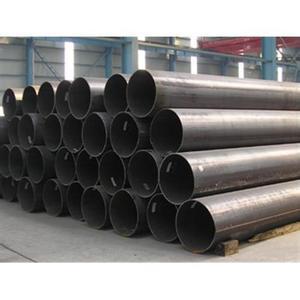56''-64'' CARBON STEEL LSAW WELDED PIPE API/ASTM/JIS/DIN
- Loading Port:
- Tianjin
- Payment Terms:
- TT OR LC
- Min Order Qty:
- 5 m.t
- Supply Capability:
- 300 m.t/month
OKorder Service Pledge
OKorder Financial Service
You Might Also Like
Packaging & Delivery
Packaging Detail: | standard export packing or as customer's requirement |
Delivery Detail: | within 10 - 30 days |
Specifications
Spiral Welded Steel Pipes and Tubes
1.Material:Q195-Q235
2.Length:1-12m
3.WT:1.0-14mm
4.O.D.:20-273mm
Product Description:
1.Material : Q235,Q345,L245,L290,L360,L415,L450,L485,GrB,X42,46,X52,X56,X60,X65,X70,X80,X100
2,Standard: SY/T5037-2000,GB/T9711-2011,API Spec 5L PSL1/PSL2,ASTM A252\A53,ISO3183,DIN17172,EN10217,JIS G3457,AWWA C200,ASTM A139,ASTM A671,ASTM A672
3.Wall thickness: 3.0mm-30mm
4.Outer diameter: φ168mm-3020mm
5,Length: 5m-12m or as your requirement
6,Corrosion protection standard: DIN30670,DIN30671, AWWAC210, AWWA C203, SY/T0413-2002,SY/T0414-2002
7,Application: Oil, gas, natural gas, water pipe, thermal electricity pipe, steel structure engineering, etc
Q195-q345 Material Steel Pipe's Materials
Elements | Chemical Compsition% | Mechanical Property | ||||||
C% | Mn% | S% | P% | Si% | Yield Point (Mpa) | Tensile Strength(Mpa) | Elongation | |
Q195 | 0.06-0.12 | 0.25-0.50 | <0.050< span=""> | <0.045< span=""> | <0.030< span=""> | >195 | 315-430 | 32-33 |
Q215 | 0.09-0.15 | 0.25-0.55 | <0.05< span=""> | <0.045< span=""> | <0.030< span=""> | >215 | 335-450 | 26-31 |
Q235 | 0.12-0.20 | 0.30-0.70 | <0.045< span=""> | <0.045< span=""> | <0.030< span=""> | >235 | 375-500 | 24-26 |
Q345 | <0.20< span=""> | 1.0-1.6 | <0.040< span=""> | <0.040< span=""> | <0.55< span=""> | >345 | 470-630 | 21-22 |
Packaging & Delivery
Packaging Detail: | Normal exporting packing,in container or bulk vessel or as per clients' request |
Delivery Detail: | 2 months after confimed contract |
Specifications
Large Diameter API 5L X70 PSL2 LSAW Steel Pipe
Grade: X42, X46, X50, X52, X60, B, C
OD: 1.5"-28"
WT: SCH10-SCH160
Brand:TPCO
Large Diameter API 5L X70 PSL2 LSAW Steel Pipe
Specifications:
u Standard: API 5L
u Grade: B, C, X42, X46, X50, X52, X56, X60, X65, X70, X80
u OD: 1.5"-28"
u WT: SCH10-SCH160
u Length: 5-12m
u Ends Finish: plain end, bevel end, grooved end
u Surface Treatment: bare, black varnished, oiled finish, red color, anti-corrosion, 3PE, FBE or epoxy coating
u Technique: hot rolled or cold drawn
u Application: api 5l steel pipe for conveying oil, water, gas
u Invoicing: based on theoretical weight or actual weight
u Payment Terms: L/C at sight, T/T or Western Union
u Trade Terms: FOB, CFR, CIF
u Certification: ABS manufacturing assessment, ABS design assessment, API 5CT, API 5L, DNV manufacturer certificate, ISO9001 quality management system certificate, ISO14001 environment management system certificate, GB/T28001 occupational health and safety management system certificate, A1 class manufacturing license of special equipment certificate, CCS, GL, LR, SGS, TüV, PDE
- Q:How do you determine the required wall thickness for steel pipes?
- The required wall thickness for steel pipes is determined through various factors and calculations. One of the primary considerations is the pressure that the pipe will be subjected to. The higher the pressure, the thicker the wall needs to be to ensure the pipe can withstand the internal forces. Another important factor is the material strength of the steel used for the pipe. Different grades of steel have varying tensile strengths, which affect the required wall thickness. The tensile strength is the maximum amount of stress a material can withstand before it fails, so it is crucial to select a steel grade that can handle the expected pressure. Additionally, the pipe's diameter plays a role in determining the required wall thickness. Larger diameter pipes generally require thicker walls to maintain structural integrity and prevent deformation under pressure. To calculate the required wall thickness, engineers use industry standards and formulas. The most commonly used standard is the American Society of Mechanical Engineers (ASME) B31 code, which provides guidelines for designing pressure piping systems. The ASME code incorporates factors such as safety margins, material properties, and pressure ratings to determine the appropriate wall thickness. Furthermore, other considerations such as temperature, corrosion, and external loads may also influence the required wall thickness. For example, high-temperature applications may require thicker walls to prevent the pipe from buckling or becoming too soft. In summary, determining the required wall thickness for steel pipes involves considering factors such as pressure, material strength, diameter, temperature, and other external forces. Engineers rely on industry standards and calculations to ensure the pipe can withstand the intended operating conditions safely.
- Q:What is the difference between hot dip galvanized steel pipe and galvanized steel pipe?
- 1, the process is different, one is chemical treatment, one is physical treatment; hot-dip galvanized coating is reliable, not easy to fall off2, hot-dip galvanized coating thickness, so strong corrosion resistance. And zinc plating (electroplating) coating evenly, surface quality is better, coating thickness is generally between a few microns to more than ten microns.3 hot galvanizing is a chemical process, which belongs to electrochemical reaction. Zinc plating is a physical treatment, just brush a layer of zinc on the surface, there is no galvanizing inside, so the zinc layer is easy to fall off. Hot-dip galvanizing is used in building construction.4 、 hot galvanized pipe is to make molten metal and iron matrix reaction and produce alloy layer, so that the substrate and coating two combination.
- Q:How are steel pipes used in the manufacturing of scaffolding?
- Steel pipes are commonly used in the manufacturing of scaffolding as they provide structural support and stability. These pipes are used to create the framework of the scaffolding structure, allowing workers to safely access and work at heights. The steel pipes are connected and secured together using couplers, providing a strong and reliable base for the scaffolding system.
- Q:Where is the difference between seamless steel pipe and welded pipe?
- Seamless pipe pressure is higher, welded pipe is generally in 10 or so MPa, now welded pipe to do seamless processing.
- Q:How are steel pipes threaded for easy installation?
- Steel pipes are threaded for easy installation by using a specialized machine called a pipe threading machine. This machine cuts precise threads onto the ends of the steel pipes, allowing them to be easily connected and tightened together using threaded fittings or couplings. This threading process ensures a secure and leak-proof connection, making installation quick and efficient.
- Q:What are the different types of steel pipe bends for pipeline routing?
- There are several types of steel pipe bends commonly used for pipeline routing, including the 90-degree bend, 45-degree bend, and the 180-degree bend. Additionally, there are also custom bends available, such as S-bends, U-bends, and offset bends, which are used in specific situations to accommodate unique pipeline routing requirements.
- Q:How are steel pipes used in the automotive exhaust systems?
- Steel pipes are commonly used in automotive exhaust systems because steel is a durable and heat-resistant material. Steel pipes are used to transport the exhaust gases from the engine to the muffler and tailpipe, ensuring that the gases are safely and efficiently expelled from the vehicle. These pipes are designed to withstand high temperatures, corrosion, and vibration, making them an essential component in the exhaust system.
- Q:Can steel pipes be used for structural applications?
- Indeed, structural applications can make use of steel pipes. With their high strength, durability, and ability to withstand various environmental conditions, steel pipes prove to be suitable for such purposes. The construction industry often relies on them to fabricate buildings, bridges, and other structures. Notably, steel pipes possess exceptional load-bearing capacity and can endure heavy loads, making them perfect for supporting structures and transferring loads. Moreover, the ease with which steel pipes can be fabricated, welded, and connected facilitates efficient construction. As a result, steel pipes emerge as a dependable and cost-effective choice for structural applications.
- Q:What does the diameter of a steel pipe project mean?
- Suppose we specify a standard that defines the nominal diameter of the same steel tube as G-1, then this G-1 is the same as DN50.I hope it doesn't make you any more confused, huh?. If you still don't understand, keep in mind that the nominal diameter is neither outside nor inside diameter.
- Q:What is the difference between steel pipes and PVC-O pipes?
- The main difference between steel pipes and PVC-O pipes is the material they are made of. Steel pipes are made of metal, specifically steel, which gives them high strength and durability. On the other hand, PVC-O pipes are made of a type of plastic called polyvinyl chloride, which is reinforced with oriented molecules, making them extremely strong and resistant to both internal and external pressures. Additionally, steel pipes are prone to corrosion, while PVC-O pipes are resistant to rust and chemical degradation. PVC-O pipes are also lighter and easier to handle and install compared to steel pipes.
1. Manufacturer Overview |
|
|---|---|
| Location | |
| Year Established | |
| Annual Output Value | |
| Main Markets | |
| Company Certifications | |
2. Manufacturer Certificates |
|
|---|---|
| a) Certification Name | |
| Range | |
| Reference | |
| Validity Period | |
3. Manufacturer Capability |
|
|---|---|
| a)Trade Capacity | |
| Nearest Port | |
| Export Percentage | |
| No.of Employees in Trade Department | |
| Language Spoken: | |
| b)Factory Information | |
| Factory Size: | |
| No. of Production Lines | |
| Contract Manufacturing | |
| Product Price Range | |
Send your message to us
56''-64'' CARBON STEEL LSAW WELDED PIPE API/ASTM/JIS/DIN
- Loading Port:
- Tianjin
- Payment Terms:
- TT OR LC
- Min Order Qty:
- 5 m.t
- Supply Capability:
- 300 m.t/month
OKorder Service Pledge
OKorder Financial Service
Similar products
New products
Hot products
Related keywords






























